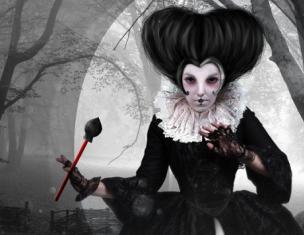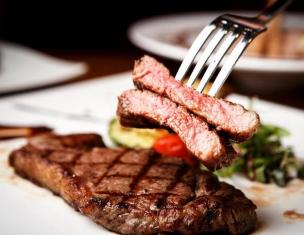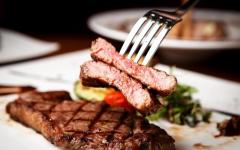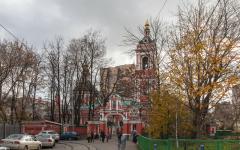Kenya Independence Day
For Kenya, Independence Day is not just a holiday. The date is December 12, 1963, this is the liberation of the people of Kenya from the heavy oppression of the British Empire, this is a chance for the first time in centuries to build a state for Kenyans, to make dreams of a decent life black man and citizen. Considering the special importance of the holiday, Kenyans celebrate this celebration on a special scale. They arrange lavish feasts, decorate houses with national symbols, organize folk games and festivities. A traveler who happens to attend the celebration of Kenya's Independence Day will leave in his memory unforgettable impressions of the goodwill of the Kenyans, national cuisine and the culture of this African people.
Russian Constitution Day
Constitution Day in Russia is a relatively young holiday and has been celebrated since 1993. Then, on December 12, the most important constitutional document was adopted in a referendum. Boris Yeltsin, the current president at that time, insisted on the adoption of the Constitution by direct expression of the people's will, bypassing the discredited and not sufficiently stable institution of parliamentarism. In the 20th century, Russia changed the Constitution five times, in 1918, in 1924, then the pre-war version of the Constitution was adopted in 1936, and the last Soviet Constitution was adopted in 1977. This Constitution is a fundamental document focused on the democratic development of the Russian state. It is important to remember that the Constitution of the state is not a formal set of laws, but a kind of binding document, the framework of the legal system of the state. Every day the Constitution works and operates, ensuring the interaction of all spheres and concepts modern society and states. Knowledge of the Constitution by citizens of the country is the key to balance government structure, systems of law and economic processes. The first copy of the Constitution, also called the official or inaugural copy, is kept in the Residence of the Head of the Russian State. The document is made of red leather, it contains the state emblem of the Russian Federation, as well as a gold embossed inscription - the Constitution of Russia. Currently, the date December 12 is not a day off, according to the amendment of the State Duma of the Russian Federation dated December 24, 2004.
Neutrality Day of Turkmenistan
On December 12, 1995, the UN General Assembly session approved a resolution recognizing Turkmenistan as a state with permanent neutrality, based on the will of the Turkmen people and government. With this decision, the young country wishes to emphasize its desire for peaceful coexistence with all peoples of the earth and undertakes not to interfere in the internal affairs of other countries. From now on, in Turkmenistan, the date December 12 is considered a public holiday.
Day of the Ground Forces of the Armed Forces of Ukraine
Every year on December 12, Ukraine celebrates Ground Forces Day, based on the decree of the President of Ukraine, which was signed on October 18. 1997. Keeping traditions Soviet army, The Ukrainian Ground Forces are still the most developed branch of the military in the Ukrainian army. They are fully equipped with modern military equipment and are in full combat readiness, and are also able to quickly respond to any threat or challenge directed against Ukraine.
Swiss Flag Day
The Swiss Confederation has existed for more than seven centuries. The independence of the state is personified by its flag; the flag of Switzerland has undergone virtually no significant changes over its centuries-old history. This is a square banner, the material is painted red, and a white cross is depicted in the center of the flag. The Swiss flag is the most unusual among European powers. The estimated time of origin of the country's flag is 1339. In ancient times, the symbols of the Swiss army were red banners; later white crosses were added to them, although the ends of the cross reached the edges of the flag. Flag Day in Switzerland is a fairly significant holiday, celebrated in all cantons of the confederation.
Day of Our Lady of Guadalupe in Mexico
This day is special in Mexico, it symbolizes the victory of Christianity in the lands of Mexico and the consolidation of Catholicism in the minds of the indigenous people. Officially celebrated since 1859, in fact since December 12, 1531. According to legend, at the beginning of the 16th century, the Virgin Mary herself appeared to the young Indian Juan Diego in the vicinity of Tepeyac Hill and gave the Indian instructions to preach the Christian faith. In honor of this event, the Basilica Church was built on the hill in honor of the Virgin of Guadalupe... The Day of the Virgin Mary of Guadalupe in Mexico is a big holiday, symbolized by the flowers that, according to legend, Juan Diego collected on the hill at the behest of the Virgin Mary.
Feast of the Nineteenth Day of the Month of Masail
An important holiday in the Arab world, translated as “questions”, has deep religious roots. Celebrated on December 12, it marks the opening of a peculiar month of “fasting”, according to the nineteen-month calendar of the Baha'i community. The holiday also has the goal of uniting society, regardless of social and financial status. On this day, all layers of society become, as it were, one whole people. The holiday takes place in a friendly atmosphere with a show of love for each other.
Hanukkah
On December 12, Jews celebrate the so-called Feast of Candles, which begins on the twenty-fifth of the month of Kislev and lasts more than a week. The holiday immortalized the events of two thousand years ago. Namely, the struggle of the Jewish people against the Egyptian and Greek oppressors. The symbol of these events was the Temple on the Temple Mount, in which the fire in the golden menorah burned for 8 days, but there was only enough oil in it for one day. Thanks to this miracle, it was possible to stock up on the necessary amount of oil and re-consecrate the Temple. To celebrate this holiday, Jews light candles in a special order. Children are given toys and money, and are also treated to sweets.
December 12 in the folk calendar
Paramon Winter Pointer
Saint Paramon suffered for the faith along with 370 martyrs in the year 250. Christians were imprisoned by pagans, forced to renounce their beliefs and worship idols. Having learned about this, the local Christian Paramon openly opposed the cruel rulers. As punishment for such a fearless act, he and the other martyrs were beheaded. Paramon was nicknamed the Winter Signaler because on his day it was possible to predict the weather for the entire month of December. “The morning is red - December will be clear,” people said. If there was a snowstorm on that day, this weather will last until December 19th. People believed that from that day on, winter walked through the villages in bearskin, knocking on the roofs, telling women to get up, cook porridge, and heat the stoves. On Paramonov day, snow forecasts were made for next year. If there is no snow in winter, there will be no bread; if the snow is deep, it will be a good year; a lot of snow - a lot of bread. The peasants believed in such signs.
Historical events of December 12
The state of Pennsylvania is perhaps the “most democratic state” in the United States; it is not for nothing that the state’s motto is the words: “Virtue, freedom and independence.” The state was the first among North American states to pass a law on the emancipation of slaves. It was one of the original twelve founding states of the United States of America and accepted the Declaration of Independence without hesitation. And December 12, 1787 and the Constitution of the new state.
On December 12, 1905, the so-called Novorossiysk Republic was formed, the putschist self-education of which was based on proletarians, peasants and rebellious Cossacks. The ideology of this pseudo-state was based on the fight against the autocratic state system existing at that time and taking the path of building socialism. This utopian formation lasted exactly two weeks (December 12 - 26, 1905). Government troops sent to Novorossiysk to suppress the rebellion crushed the uprising literally in one day. The organizers and instigators of the coup were severely punished, and legitimate power was restored in the city.
The Indian Emperor George V announced the transfer of the capital to Delhi. The capital of India was moved several times from one city to another, and only in 1911 was it finally decided that Delhi would remain the capital of India. If you look at a map of India, you can see how Delhi seems to dominate the entire country. The city is located in the center of the northern part of the state, at the intersection of important cultural, economic and transport routes. Since ancient times, it has developed a unique metropolitan tradition and the elite of society. And most importantly, all Indian states perceive Delhi as the capital of the entire state, and not of any ethnically isolated territory.
Cities liberated on December 12, 1941 during the Moscow defensive - offensive operation, tank brigade of Colonel Kravchenko A.G. and the Guards Corps, Lieutenant General P.A. Belov. The city of Stalinogorsk (now Novomoskovsk) suffered greatly from the short-term German occupation, which lasted no more than seventeen days.
On December 12, 1961, American radio amateurs, with the support of NASSA, launched an amateur radio satellite into orbit, the purpose of which was the stable transmission of a telegraph signal. The satellite operated in orbit for no more than twenty-two days and stably transmitted HI HI signals at frequency 144.983.
In the period from 1901, in Great Britain there appears the new kind sports, table tennis, later called Ping-Pong. It is believed that the founders of the game were English soldiers who were returning from service in India and Africa. The British James Gibb made a significant contribution to the development of the game; he significantly modernized the attributes for ping-pong and largely reworked the rules of table tennis. Soon a new game became so popular that on December 12, 1901, a table tennis association was formed in England. And in 1927, London hosted the first World Table Tennis Championships.
Born on December 12:
Leonid Bykov(1928 - 1979), Russian and Ukrainian actor, director.
On December 12, 1928, the outstanding Soviet and Ukrainian actor and director Leonid Bykov was born. Leonid Fedorovich, possessed natural talent to acting. All the roles he played were given to him so naturally and easily that the viewer believed this brilliant actor from the first moments of his appearance on camera. Famous roles; Maxim Perepelitsa - Maxim, Zaichik - Lev Zaichik, only old men go into battle - Titorenko and others. The actor loved Ukraine very much and proudly bore the title of People's Artist of Ukraine. After the death of Leonid Fedorovich, he was survived by his wife, daughter and son.
Nikolay Karamzin(1766 - 1826), Russian writer, historian and historiographer.
Until the end of his life, Nikolai Mikhailovich wrote the History of the Russian State. He began writing from very ancient times, from the time when the Slavs were first mentioned. The writer managed to bring “his History” to the period of “turmoil.” Karamzin’s colossal work includes 12 volumes of text containing high literary merit; historical sources, thoughts and opinions of domestic and European authors are analyzed and published in them.
Erasmus Darwin(1731-1802), English naturalist, physician, fortune teller, poet.
Promoted the development of evolution under the influence external factors environment. He was a doctor and conducted a number of experiments in physics and biology. He gained fame as a predictor, as he foresaw the scientific and technical leap of mankind. He was persecuted by the church. He was married twice and had ten children.
Vladimir Shainsky(1925) Russian and Soviet composer.
The legendary Soviet and Russian composer was born on December 12, 1925 in Kyiv. People's Artist of the RSFSR. The most talented composer of his time, he wrote and is composing music for films, cartoons, musicals, and television shows. But his main activity is aimed at creating simple, soulful music that would win the hearts of both children and adults. Shainsky's music is kind and memorable for a lifetime, for many generations.
Edvard Munch(1863-1944), artist.
Alfred WERNER(1866-1919), Swiss chemist, Nobel laureate.
Years of life: December 12, 1866 - November 15, 1919. An outstanding Swiss chemist, he made a number of important discoveries in the field of coordination chemistry. For which he was awarded the Nobel Prize.
Nikolai Mikhailovich Karamzin was born in 1766.
My friend! Materiality is poor:
Play with your dreams in your soul,
Otherwise life will be boring
- he wrote.
The name of Karamzin is firmly and forever associated in the reader’s consciousness with prose works, but as an original lyricist, alas, he is remembered much less often. A Russian writer and historian, critic and journalist, creator of the “History of the Russian State,” he meanwhile made a significant contribution to the development of Russian poetry. Every writer, Karamzin believed, “writes a portrait of his soul and heart.”
The surname began to be written in its current version only in the 19th century - Pushkin zealously advocated for such a spelling, arguing that Fonvizin was “a Per-Russian Russian,” which in the mouth of Alexander Sergeevich undoubtedly meant active praise. In fact, von Wisin, a Livonian knight, was captured under Ivan IV, so there is no merit or even free choice in the Russification of the family. Of course, this does not matter, but sometimes it comes into amusing contradiction with the views of the writer.
Denis Ivanovich, through the care of his father, a man not very educated, but who valued science, received a decent home education and then entered the gymnasium at Moscow University, where he was distinguished by his abilities and successes, and then to the university itself, to the Faculty of Philosophy. Fonvizin did not study there for long, he was dissatisfied with his teachers, who were guilty of “drunkenness and negligence,” however, he learned German and French well and received some humanitarian training.
Fonvizin's inclination towards fine literature manifested itself quite early, and he began publishing while still in school. The first texts were not stunning, but quite literate, and the first play, Corion, immediately revealed the acumen of a playwright in the young author, so the success of The Brigadier was quite logical. It must be said that the work, for all its lightness and grace, is somewhat overloaded with didactics, but this cannot in any way be blamed on the author due to the context of the time.
The furor created by “Nedorosl” could not be compared with the success of “Brigadier”, and immediately brought Fonvizin to the vanguard of Russian literature. At the premiere, the author was almost hit by wallets flying onto the stage - which meant unconditional and complete delight, and Grigory Potemkin, in essence, the second person in the state, spoke like this: “Die now, Denis, or at least don’t write anything else!” Your name will be immortal because of this one play” - and after all, he turned out to be a prophet, the favorite of the empress. Moreover, “Die, Denis, you can’t write better” - became a catchphrase, almost along with quotes from “The Minor”, taken apart for reprises... Fonvizin did not live to see half a century, saw semi-disgrace and adversity, wrote a lot more, but remained in history the author of one comedy - but a wonderful one.
In 1863 in Northern capital water supply appeared. Before this, St. Petersburg residents used wells or water carriers. About 400 thousand residents of the central part of the city received the opportunity to use the water supply. Each of them was entitled to 43 liters of water per day. For a very reasonable price: from 8 to 12 kopecks per 100 buckets.
By the way, even in tsarist times the water was turned off for non-payment. More precisely, they stopped delivering it. A monument to a water carrier pulling a barrel now adorns the entrance to the Water Pipe Museum. Already in our time it opened in the first St. Petersburg water tower, at 56 Shpalernaya Street.
Shainsky has been known to everyone since childhood - from the age of three, children begin to hum his songs written for the cartoons “Cheburashka”, “Shapoklyak”, “Katerok”, “Little Raccoon”...
In the songs “Chunga-Changa”, “Antoshka”, “It’s Fun to Walk Together”, “Smile”, “Blue Car”, “Grasshopper”, “Crocodile Gena”, the composer, in his own way developing the traditions of his predecessors, boldly introduced jazz into children's songs verses, syncopated and beat rhythm, “Bach” cadences combined with bright melodies and brilliant pop arrangements. Without adapting to the intonations of familiar children's songs, he creates melodies that modern children seem to have composed themselves.
In total, he wrote more than 300 songs, and a third of them can only be called hits: “Hers, Herbs”, “Blackbirds”, “Corner of Russia”, “Led Rosemary”, “When the Gardens Bloomed”, “Why are you indifferent to me” , “Parental home”, “I’ll get off at the distant station”...
On December 12, 1937, the first elections to the Supreme Soviet took place in the Soviet Union - “universal, direct, equal, by secret ballot,” as propaganda boasted.
“These were not just elections,” said the short course on the history of the party, “but a great holiday, a triumph of the Soviet people, a demonstration of the great friendship of the peoples of the USSR.”
The morning issue of Literaturnaya Gazeta published a letter from Alexei Tolstoy to his voters under the heading “Our path is straight and clear.” It said that “the great Stalin is leading us to the shining heights of communism... This day is not far off... For the sake of this red day we all live and we will give all our strength to it.”
In fact, the elections were a mocking comedy because there was only one candidate on each ballot. Voters were given a ballot and an envelope, forced to go into a booth and told to seal the envelope. Of course, it was possible to cross out the candidate, but, firstly, this would still not change anything, and secondly, there were some people standing at the polling station, escorting the voter to the booth, and the person was afraid to stay there for an extra second. He put the ballot in an envelope, sealed it as instructed, and put it in a ballot box, at which stood two pioneers who gave each voter a pioneer salute.
Such “elections” took place for another fifty years – without envelopes and pioneers, but with the same “election from one” procedure.
In 1941, the Sovinformburo transmitted the message “The failure of the German plan to encircle and capture Moscow.”
The message said: “From November 16, 1941, German troops, having deployed 13 tank, 33 infantry and 5 motorized infantry divisions against the Western Front, launched a second general attack on Moscow... Until December 6, our troops fought fierce defensive battles... December 6 In 1941, the troops of our Western Front, having exhausted the enemy, launched a counter-offensive. From December 6 to 10, units of our troops occupied and liberated over 400 from the Germans. settlements. As a result, during the period from November 16 to December 10, the following were captured and destroyed, excluding aviation actions: tanks - 1,434, vehicles - 5,416, guns - 575, mortars - 339, machine guns - 870. German losses during this time amounted to over 85 thousand killed." .
In 1979, the Politburo of the CPSU Central Committee decided to send troops to Afghanistan. The next day, a task force under the leadership of Army General Sergei Akhromeyev was sent to Tashkent and Termez to organize the deployment of troops. On December 25, at noon Moscow time, the troops received a directive to cross the state border. The deployment of troops began 3 hours later.
The introduction of formations and units of the 40th Army into the Democratic Republic of Afghanistan was carried out in three directions: through Kushka, Termez and Khorog. On December 27, the Zenit special forces stormed the Topayi-Tajbek Palace, during which President Amin was killed. Babrak Karmal became the new head of state. It was widely believed that a “limited contingent of Soviet troops” should enter Afghanistan in order, on the one hand, to assist the Afghan leadership in protecting the gains of the so-called “April Revolution”, and on the other, to forestall the reactionary forces and not allow them to establish their own order in this country.
The war ended after more than 9 years. On February 15, 1989, the last columns of Soviet troops left Afghanistan. The last to cross the Friendship Bridge on the border Pyanj River was the commander of the 40th Army, General Boris Gromov.
The Constitution is the main document of the country, the foundation of the executive and legislative powers.
This important document spells out all the rights and obligations of the country’s citizens and the directions of development of the state. This document has a rather long history.
Constitution of the Russian Federation
The Constitution of Russia can rightfully be called the core of the entire state legal system. Thanks to this document, the content and meaning of all adopted laws are determined. The first Constitution in our state appeared in 1924. Since then, the document has undergone many changes and amendments.
In 1990, our Constitution was able to survive two political crises without losing its significance and dignity. Its predecessors were the Constitution of the RSFSR and Soviet Union, which was adopted in 1924, cementing the position of socialism in the country.
Constitution Russian Federation- the most important document state standard ensuring full democratic development. Almost every action of the country's president is carried out in accordance with this document. Every citizen of the country must strictly comply with all the requirements and obligations prescribed in the document, because this is state law. Every Russian should know what date December 12 is, what holiday it is customary to celebrate in Russia.
Appearance of the main document of the country
The Russian Constitution looks very impressive. On the red binding is the coat of arms of our country - a two-headed eagle, and on the cover of the document the name is written in gold letters. But this is the appearance of only one copy, or rather the original, stored within the walls of the Kremlin.

Only three heads of our state had a chance to touch the Constitution: Boris Nikolaevich Yeltsin, Vladimir Vladimirovich Putin and Dmitry Anatolyevich Medvedev. The expensive edition is used only for the ceremonial inauguration of the president.
Constitution Day in the USSR
In the Soviet Union, the Constitution was adopted in 1924, on January 31. This became the impetus for the victory of socialism in the country. The formation of the USSR was actually secured by this document. The state now rightfully included all the union republics.
Twelve years later, in 1936, the “Stalinist” Constitution was adopted. It contained not only the basic social and political issues that needed to be resolved, but also indicated information about the announcement of the end the most important stage the formation of socialism on the territory of the Soviet Union. Until 1977, Constitution Day was celebrated on December 5th.
The “Stalinist” document was replaced by the Constitution, finalized by Brezhnev. Otherwise, this document was called “stagnant”, because its effect lasted for 16 long years.
Constitution Day is now
By rights, now December 12th is Constitution Day of the Russian Federation. After all, it was on this day that this declaration was officially adopted. At that time, Russian President Boris Nikolayevich Yeltsin approved this day as a day off for all government organizations.
Many people are now wondering whether December 12 is a holiday or not. Unfortunately no. In 2004, deputies of the State Duma made minor amendments to Labor Code and a calendar of holidays.
According to the new rules, this day is not considered a day off; now it is simply a memorable date glorifying the main state law.
Celebration traditions
Despite the fact that December 12 is not considered a day off, what holiday in Russia goes unnoticed? It is customary to widely celebrate Constitution Day. The State Duma holds festive or ceremonial sessions, meetings are held in all government organizations: schools, kindergartens, factories, hospitals, etc.

In educational institutions we conduct extracurricular classes in jurisprudence, in which children study the basic provisions and fundamental laws of the Constitution of the modern Russian state.
Every Russian should be proud that on December 12 the country praises the main state document - the Constitution of Russia. We hope that this article helped answer the question about the significance of such a date as December 12, what holiday is celebrated in Russia on this day, and most importantly, how.
Neutrality Day of Turkmenistan. On December 12, Turkmenistan celebrates the second most important public holiday in its still short independent history - Neutrality Day.
National Literature Day of Kyrgyzstan. National Literature Day of Kyrgyzstan is a very young holiday. Deputies of the republic's parliament proposed celebrating it in 2011.
Day of customs officers of the Republic of Kazakhstan. The holiday, which is celebrated annually in Kazakhstan on December 12, was established in honor of the founding of the customs service of this state. The day when this department began its existence is December 12, 1991.
Ukrainian Ground Forces Day. The national professional holiday - the Day of the Ground Forces of Ukraine is celebrated annually on December 12.
Swiss Flag Day. Swiss Flag Day is celebrated annually on December 12th. This holiday was established in honor of one historical event.
Day of the Virgin of Guadalupe in Mexico. On this day, pilgrims from all over Mexico gather at the gates of the country's religious center - the Basilica of the Virgin of Guadalupe, located in the northern part of the capital Mexico City.
Feast of the Nineteenth Day of the Month of Masail. December 12 marks the beginning of the month of Masail, which means “Questions” in Arabic. On this day - the first day of the month of Masail according to the nineteen-month Bahá'í calendar - an important holiday is celebrated - the Feast of the Nineteenth Day of the month.
In 1901, the Table Tennis Association was founded in Great Britain. The origins of table tennis were the British military, who served in India and South Africa.
In 1979, the Politburo of the CPSU Central Committee officially decided to send Soviet troops into Afghanistan. On October 8, 1979, Nur Muhammad Taraki, the founder of the People's Democratic Party of Afghanistan and the first leader, was killed Democratic Republic Afghanistan. Hafizullah Amin, who, despite all his loyalty to Moscow, came to power in the country.
In 1993, during a popular vote, the Constitution of the Russian Federation was adopted. On June 12, 1990, our country adopted the “Declaration of State Sovereignty of the RSFSR.” The document established a new name - the Russian Federation and stated the need to adopt a new Constitution of Russia.
In 2012, celebrations began to mark the 850th anniversary of Notre-Dame de Paris. On December 12, 2012, festive celebrations began in Paris dedicated to the 850th anniversary of Notre-Dame de Paris - the famous Notre-Dame Cathedral.
Constitution Day of the Russian Federation. Constitution Day is one of the most significant public holidays in Russia and is celebrated annually on December 12. On this day in 1993, the Constitution of the Russian Federation was adopted by popular vote in our country.
In 1817, the Moscow Manege opened (November 30). On December 12, 1817, the grand opening of the Manege took place in Moscow. This grandiose building was built in six months according to the design of the famous engineer and mechanical scientist, Lieutenant General Augustin Betancourt.
50 years since opening kindergarten No. 72 “Kencheeri”, Yakutsk (1966).
Name day. Daniil, Denis, Paramon, Sergey.
Born on this day. (1766) Nikolai Karamzin, Russian historian-historiographer, writer, poet. (1884) Zinaida Serebryakova, Russian artist. (1915) Frank Sinatra, American singer and actor. (1925) Vladimir Shainsky, Soviet and Russian composer, People's Artist of the RSFSR. (1928) Chingiz Aitmatov, Soviet and Kyrgyz writer and statesman. (1928) Leonid Bykov, Soviet director, screenwriter, actor. (1941) Vitaly Solomin, Soviet and Russian theater and film actor, People's Artist of Russia. (1946) Klara Novikova, Soviet and Russian pop artist, People's Artist of Russia.
According to the folk calendar. Paramon Winter Pointer. In Rus', Paramon was nicknamed the Winter Pointer because it was possible to predict the weather for the entire December based on his day. “The morning is red - December will be clear,” people noted. If there was a snowstorm, then such weather could last until St. Nicholas the Winter (December 19). The crimson dawn foreshadowed strong winds.
By lunar calendar. Thirteenth day of the lunar cycle. It is unsuccessful in that everything seems to return to normal, and in order to break out of the vicious circle of problems, you need to work on yourself. Meanwhile, it also has its advantages. This is one of the most social days; the time has come for social events, group contacts, and accumulation of information.
Events and dates of December 12 - real, main and past...
Surely many of you are interested in the history of the world and your country, the distant and recent past, past events, memorable dates, significant and significant successes in development and all kinds of discoveries, as well as folk signs, as we are sure, everyone would not mind finding out which of the famous and successful people born on December 12, in different years and eras.
Below you will find out how certain past and real events of December 12 influenced the course of world history, or of a particular country, how the date of this day is remembered, what kind of incident, something unusual this day was remembered for, and also what is remarkable date of this day, who was born and died from famous people and much more. In a word, we will help you understand all this in more detail and to your benefit. You will find on this page all the answers to these topics that interest you; we have tried to put together as many materials as possible for this day of the year.
Who was born on December 12
Gustave Flaubert (French Gustave Flaubert; December 12, 1821, Rouen - May 8, 1880, Croisset) is a French realist prose writer, considered one of the largest European writers of the 19th century. He worked a lot on the style of his works, putting forward the theory of the “exact word” (le mot juste). He is best known as the author of the novel Madame Bovary (1856).
Fedor Filippovich Konyukhov. Born on December 12, 1951 in the village of Chkalovo, Zaporozhye region. Russian traveler, writer, artist, priest of the Ukrainian Orthodox Church.
Polina Yanovna Iodis. Born on December 12, 1978 in Moscow. Russian singer, athlete, former lead singer of the pop group Blestyaschiye.
Vitaly Methodievich Solomin. Born on December 12, 1941 in Chita - died on May 27, 2002 in Moscow. Soviet and Russian theater and film actor. People's Artist of the RSFSR (1992).
Francis Albert Sinatra (English: Francis Albert Sinatra: December 12, 1915, Hoboken, New Jersey - May 14, 1998, Los Angeles) - American actor, singer (crooner) and showman. He won the Grammy Award nine times. He was famous for his romantic style of singing songs and the “velvet” timbre of his voice.
Klara Borisovna Novikova (née Herzer; December 12, 1946, Kyiv) - Soviet and Russian pop artist, comedian. Honored Artist of the Russian Federation (1992), People's Artist of Russia (1997). Member Public Council Russian Jewish Congress.
Leonid Fedorovich Bykov. Born on December 12, 1928 in the village of Znamenka, Slavyansky district, Donetsk region, he died on April 11, 1979 near the village of Dymer near Kiev. Soviet actor, director, screenwriter. Honored Artist of the RSFSR (1965). People's Artist of the Ukrainian SSR (1974).
Chingiz Torekulovich Aitmatov (Kyrgyzstan Chyngyz Torokulovich Aitmatov) (December 12, 1928, Sheker village, Kyrgyzstan - June 10, 2008, Nuremberg, Germany) - Kyrgyz Soviet writer, writing in Kyrgyz and Russian, people's writer of the Kyrgyz SSR (1974), Hero of the Socialist Labor (1978).
Sergei Svetlakov (12/12/1977 [Ekaterinburg]) - KVN player, star of “Our Russia”;
Anatoly Alyabyev (12/12/1951 [Arkhangelsk region]) - Soviet athlete (biathlon), Honored Master of Sports;
Vladimir Shainsky (12/12/1925 [Kyiv]) - Soviet composer;
Isaac Kaplan (12/12/1924 [Moscow] - 05/19/1997 [St. Petersburg]) - Soviet and Russian film artist. People's Artist of the Russian Federation (1996);
Natalya Malysheva (12/12/1921 - 02/04/2012) - Soviet rocket engine designer, later - nun Adriana;
Gulsum Abdrakhmanova (12/12/1917 - 10/07/1970 [Semipalatinsk]) - Kazakh and Soviet actress, People's Artist of the Kazakh SSR (1964; Honored Artist of the Kazakh SSR since 1944);
Lev Karsavin (12/12/1882 [St. Petersburg] - 07/20/1952 [village of Abez (Komi Autonomous Soviet Socialist Republic)]) - Russian religious philosopher and historian;
Gerd Rundstedt (12/12/1875 [Aschersleben, Prussia] - 02/24/1953 [Hannover, Lower Saxony]) - German field marshal during the Second World War;
Cao Kun (12/12/1862 [Tianjing] - 05/15/1938 [Tianjing]) - 8th President of China;
Alexander Ypsilanti (12/12/1792 [Constantinople] - 01/31/1828 [Vienna]) - leader of the Greek Revolution, Russian general;
Maria Louise (12/12/1791 [Vienna] - 12/17/1847 [Parma]) - second wife of Napoleon I, daughter of the Austrian Emperor Franz I;
Nikolai Karamzin (12/12/1766 [Mikhailovka village] - 06/03/1826 [St. Petersburg]) - Russian writer, publicist and historian.
Dates December 12
Ukraine celebrates Army Day
In Kazakhstan - Day of Customs Officers
In Turkmenistan - Neutrality Day
Kenya celebrates Independence Day or Republic Day
In Mexico - Day of the Virgin Mary of Guadalupe
In Kyrgyzstan - Day of National Literature
According to the folk calendar, this is Paramon the Winter Guide
On this day:
in 1398, the great conqueror Timur carried out a mass genocide of Hindus; on this day, about one hundred thousand prisoners were slaughtered in Indian prisons
in 1586, Stefan Batory, a governor from the country of vampires, who became the king of Poland and Lithuania, died
in 1787, the US Constitution was ratified by the state of Pennsylvania, becoming the second in this new state of the New World
in 1911, India changed its capital - instead of Calcutta, it became the city of Delhi
in 1917, a major train accident in France - 700 soldiers returning home from the front found their fate near the Belgian Saint-Michel-de-Maurienne
Douglas Fernbex, an American actor and star of the silent film era, died in 1939.
in 1991, the RSFSR recalled its deputies from the Supreme Soviet of the USSR and denounced the union treaty
Heydar Aliyev, the first president of the independent Republic of Azerbaijan, died in 2003
Switzerland joined the Schengen zone in 2008.
Events of December 12
The state of Pennsylvania is perhaps the “most democratic state” in the United States; it is not for nothing that the state’s motto is the words: “Virtue, freedom and independence.” The state was the first among North American states to pass a law on the emancipation of slaves.
It was one of the original twelve founding states of the United States of America and accepted the Declaration of Independence without hesitation. And December 12, 1787 and the Constitution of the new state.
On December 12, 1905, the so-called Novorossiysk Republic was formed, the putschist self-education of which was based on proletarians, peasants and rebellious Cossacks. The ideology of this pseudo-state was based on the fight against the autocratic state system existing at that time and taking the path of building socialism.
This utopian formation lasted exactly two weeks (December 12 - 26, 1905). Government troops sent to Novorossiysk to suppress the rebellion crushed the uprising literally in one day. The organizers and instigators of the coup were severely punished, and legitimate power was restored in the city.
The Indian Emperor George V announced the transfer of the capital to Delhi. The capital of India was moved several times from one city to another, and only in 1911 was it finally decided that Delhi would remain the capital of India. If you look at a map of India, you can see how Delhi seems to dominate the entire country.
The city is located in the center of the northern part of the state, at the intersection of important cultural, economic and transport routes. Since ancient times, it has developed a unique metropolitan tradition and the elite of society. And most importantly, all Indian states perceive Delhi as the capital of the entire state, and not of any ethnically isolated territory.
Signs December 12 - the day of Paramon the Winter Guide
In the church on December 12, the memory of Saint Paramon, who suffered for the faith along with other 370 martyrs in the year 250, is venerated. As you know, Paramon was imprisoned by pagans who forced him to renounce Christian teaching.
It was Paramon who initially stood up for righteous Christians against whom mass persecution was organized. As a result, he was tortured and then beheaded along with the rest of those arrested.
In Rus', Paramon was called the Winter Indicator, since it was on this day that the weather for the near future could be predicted. Also on the morning of December 12, they took brooms or brooms to clear the roofs of snow caps. It was forbidden to use a shovel for this purpose; the signs explained that this was done to prevent the roof from becoming leaky.
By the way, it’s interesting that in Rus' there was a special attitude towards the broom; it was attributed to magical properties. It was impossible to take revenge in one hut with different brooms - this was a sign that was strictly observed. It was also impossible to keep a broom under the stove - the food would spoil.
By December 12, the weather was quite cold, and people believed that at this time Winter roamed the streets and even rooftops in a bearskin, waking up women early in the morning to light the stoves and prepare food, since it was very difficult to get up in the morning.
There was another interesting sign: on December 12, it was necessary to feed the chickens with buckwheat only from the right sleeve - this way they would start laying eggs earlier. In addition, a nail was driven into the western wall of the bathhouse bottom log so that the building is strong and no one in the family gets sick.
They said that on December 12 you must borrow something from your neighbors: bread, eggs, butter, etc. This way you can attract good luck for the next year.
Fortune telling for girls was common on December 12, and there were also signs associated with this day. So, the girls kneaded the dough using river water, for which they approached the reservoir 3 times and brought water in their mouths. When they scooped up water, they looked at what came into their hands.
Pebbles predict marriage with a builder, earth - with a grain grower, fish - with a fisherman. The baked goods were then placed on a bench, and the girls brought their roosters. Whose rooster tastes the bread first, the girl will have the wedding first.









